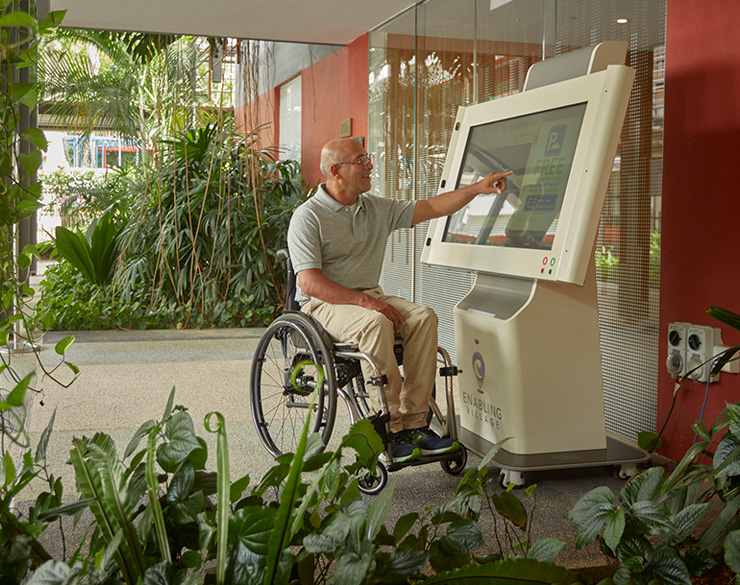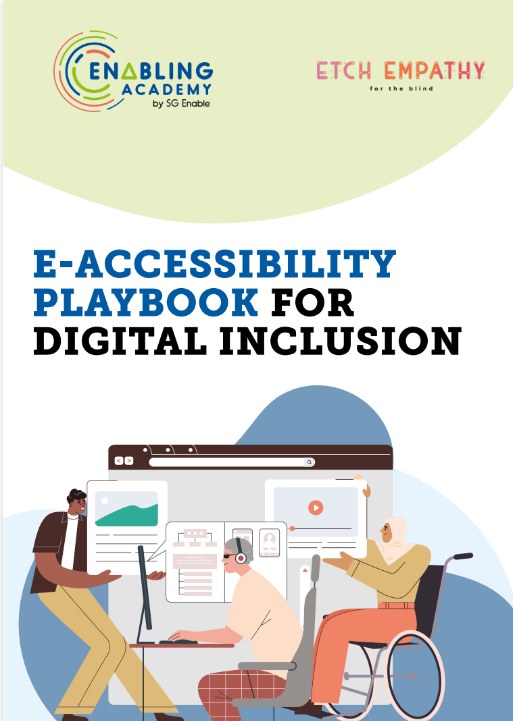Accessibility
When environments, products and services are made accessible, persons with disabilities can live, work and play more independently.
These can be achieved through improving physical spaces, digital content, communication means and attitudes.
Benefits of Accessibility
For Persons with Disabilities:
Accessibility enhances independent living and enables them to be more meaningfully engaged in the community. A wheelchair user can travel to the office more easily in a barrier-free environment, for instance. Electronic accessibility, or E-accessibility, enables persons with disabilities to use information and communication technologies such as the Internet, and access services and information that are increasingly going online.
For Persons without Disabilities:
Accessible environments benefit persons without disabilities too. For example, removing curbs helps parents with prams and shoppers with trolleys to move up the pedestrian walkway more easily. Captions on videos at noisy MRT platforms helps everyone to understand the content.
For Content, Product and Infrastructure Owners:
Adopting accessibility extends your market reach and enhances your brand. Tech companies, such as Apple and Microsoft, have also been adding more accessibility features in their mainstream products, allowing persons without disabilities to benefit too.
For Businesses:
Ensuring that the environment and digital information and content are accessible to persons with disabilities will enable employers to hire and retain talents with disabilities.When businesses ensure that their services and products are universally designed or inclusive, they can expand their reach and gain a bigger market share.
Project Showcase
E-accessibility Playbook for Digital Inclusion
The use of information and communication technologies is an essential part of the economic, educational and social lives of many people today. In particular, it is vital that websites can be used by all, so that persons with disabilities have the same access to information and opportunities as everyone else.
Developed by SG Enable, in collaboration with Etch Empathy, this playbook points out why businesses cannot afford to overlook e-accessibility, provides insights into the digital needs of persons with disabilities and practical principles on how to create e-accessible content.
Design Playbook for Inclusive Spaces
The Design Playbook for Inclusive Spaces provides insights into the needs of persons with disabilities and ideas on how to develop spaces and experiences that would be inclusive for them.
Produced by SG Enable, in collaboration with STUCK Design, the playbook contains design principles and ideas in the areas of retail, food & beverage, wellness & community services, training, and wayfinding - starting points for any organisation's
inclusive design journey.
Mobility Assistance for the Visually Impaired and Special users (MAVIS)
MAVIS is a travel assistance app to support commuters with disabilities in taking public buses. The app triggers audio alerts of the bus service number and destination for commuters with visual impairment, while wheelchair users can use it to check if there is available space for them to board a bus. The app also alerts bus captains of commuters with disabilities who are waiting to board the bus.
The trial of this app is part of a collaboration between SG Enable and Land Transport Authority in 2019, and has since been extended for three years (2021-2024).
Find out more about MAVIS >Digital for Life Initiatives
In support of IMDA’s Digital for Life (DfL) movement, we launched the “Digital Enablement Programme” with Microsoft and SPD to equip persons with disabilities with digital skills for work and daily living. With the DfL funding, we also kickstarted efforts to promote e-accessibility in the essential services sector.
E-Accessibility Workshops
In partnership with Etch Empathy, we run e-accessibility workshops for web/app developers and designers, as well as persons with disabilities interested in learning about e-accessibility testing. These workshops dive into the importance of providing universally accessible digital services, and offer practical tips on how to create e-accessible services, information and products.







